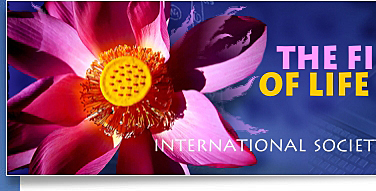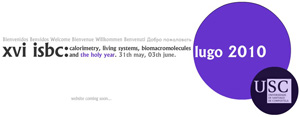About ISBC:
The International Society for Biological Calorimetry (ISBC) was formed to draw together those scientists from across the world who are involved in developing and/or applying direct calorimetry for biological and medical processes. It is a non-profit organization with no membership fee which meets about every two years in a different country. All participants of a conference are automatically members of ISBC until the next one. The Chairperson elected at the conference is in charge of
next one and the Secretary and Committee are chosen at each conference to plan and help prepare the next one.
Richard Kemp at Aberystwyth, Wales / UK (rbk@aber.ac.uk) has been Secretary General of ISBC since 1980.
The Conference Proceedings are normally published in Thermochimica Acta after the usual peer review process.
Starting with its VIIth conference the ISBC has presented the Lavoisier Medal to an internationally acknowledged scientist for an outstanding contribution to the development and/or the application of direct calorimetry in biology and medicine (see details in Thermochimica Acta 219, ix).

In
1783, Lavoisier was the first to construct an ice calorimeter and to
measure animal heat production as well as respiration and came to the
crucial conclusion:
"La respiration est donc une combustion, à la vérité fort lente" (Respiration is thus a combustion, a slow one to be precise)
Brief History of the ISBC:
At the instigation principally of Tony Beezer (Chelsea College, London University) and Bob Taylor (LKB Ltd, UK), a group of us met for an afternoon conference at the Chemistry Department of the former to discuss problems in and applications of heat conduction calorimetry in biology. Such was its success that it was decided to hold another meeting hosted by Tony the next year and open it to international participation. The search for a title with a convenient acronym resulted in the International Symposia on Microcalorimetric Applications in Biology (ISMAB). With the aid of the Swedish calorimeter manufacturer LKB, the 1974 meeting introduced such foreign stalwarts as Lee Hansen and Giovanni Rialdi and was so successful that not all of us could attend the conference dinner and regretfully had to go to the Trattoria Mama Rosa in Notting Hill instead! As an off-shoot, in the ’70s Peter Fletcher and I edited the Microcalorimetry Research Report.
With continued interest and support by LKB Produkter AB in Sweden through Bob, ISMAB thrived mainly with London meetings hosted mostly by Tony but also by Arthur James, though there was one excursion to sunny Aberystwyth in 1980. The takeover of LKB and the emergence of Thermometric AB stimulated thoughts that the time was right to cross the English Channel and we welcomed the proposal by Erich Gnaiger to hold the VIth ISMAB in the delightful ski resort of Schröcken in Vorarlberg, Austria as a satellite symposium to the 10th ESCPB Conference in Innsbruck.
Our return to London in April 1990 coincided with the 60th birthday of the renown calorimeter designer and far-sighted protagonist of the value of the instrument for analytical applications in Biology, Ingemar Wadsö. The ISBC Committee decided to mark this anniversary by creating a titled lecture and who better than Lavoisier for the name of it! Ms Swan Go (Elsevier), who was to become an ever-friendly supporter of the Society, kindly agreed to an issue of Thermochimica Acta becoming the conference Proceedings and acting as the festschrift for Ingemar. Astonishingly, it was published 9 months after the meeting. It was not until 1993, however, that the Secretary secured sufficient funds to mint the Medal that was given retrospectively to the first holders.
After the 1990 meeting the Committee felt it was appropriate for ISMAB to metamorphose to ISBC, even though the initials did not have a ring to it. In respect for the heritage of ISMAB, it was decided to preserve the original numbering. In the 1990s the occasional Dubrunfaut Award was instituted for non-calorimetrists who have made a great contribution to bio thermal studies. Publication of the Proceedings has become the norm, with two more of them being festschrifts, for Ingolf Lamprecht (1995) and Richard Kemp (2002).
"La respiration est donc une combustion, à la vérité fort lente" (Respiration is thus a combustion, a slow one to be precise)
Brief History of the ISBC:
At the instigation principally of Tony Beezer (Chelsea College, London University) and Bob Taylor (LKB Ltd, UK), a group of us met for an afternoon conference at the Chemistry Department of the former to discuss problems in and applications of heat conduction calorimetry in biology. Such was its success that it was decided to hold another meeting hosted by Tony the next year and open it to international participation. The search for a title with a convenient acronym resulted in the International Symposia on Microcalorimetric Applications in Biology (ISMAB). With the aid of the Swedish calorimeter manufacturer LKB, the 1974 meeting introduced such foreign stalwarts as Lee Hansen and Giovanni Rialdi and was so successful that not all of us could attend the conference dinner and regretfully had to go to the Trattoria Mama Rosa in Notting Hill instead! As an off-shoot, in the ’70s Peter Fletcher and I edited the Microcalorimetry Research Report.
With continued interest and support by LKB Produkter AB in Sweden through Bob, ISMAB thrived mainly with London meetings hosted mostly by Tony but also by Arthur James, though there was one excursion to sunny Aberystwyth in 1980. The takeover of LKB and the emergence of Thermometric AB stimulated thoughts that the time was right to cross the English Channel and we welcomed the proposal by Erich Gnaiger to hold the VIth ISMAB in the delightful ski resort of Schröcken in Vorarlberg, Austria as a satellite symposium to the 10th ESCPB Conference in Innsbruck.
Our return to London in April 1990 coincided with the 60th birthday of the renown calorimeter designer and far-sighted protagonist of the value of the instrument for analytical applications in Biology, Ingemar Wadsö. The ISBC Committee decided to mark this anniversary by creating a titled lecture and who better than Lavoisier for the name of it! Ms Swan Go (Elsevier), who was to become an ever-friendly supporter of the Society, kindly agreed to an issue of Thermochimica Acta becoming the conference Proceedings and acting as the festschrift for Ingemar. Astonishingly, it was published 9 months after the meeting. It was not until 1993, however, that the Secretary secured sufficient funds to mint the Medal that was given retrospectively to the first holders.
After the 1990 meeting the Committee felt it was appropriate for ISMAB to metamorphose to ISBC, even though the initials did not have a ring to it. In respect for the heritage of ISMAB, it was decided to preserve the original numbering. In the 1990s the occasional Dubrunfaut Award was instituted for non-calorimetrists who have made a great contribution to bio thermal studies. Publication of the Proceedings has become the norm, with two more of them being festschrifts, for Ingolf Lamprecht (1995) and Richard Kemp (2002).
The latest news:
|
Please, find the poll in the bottom left corner of this page.
|




